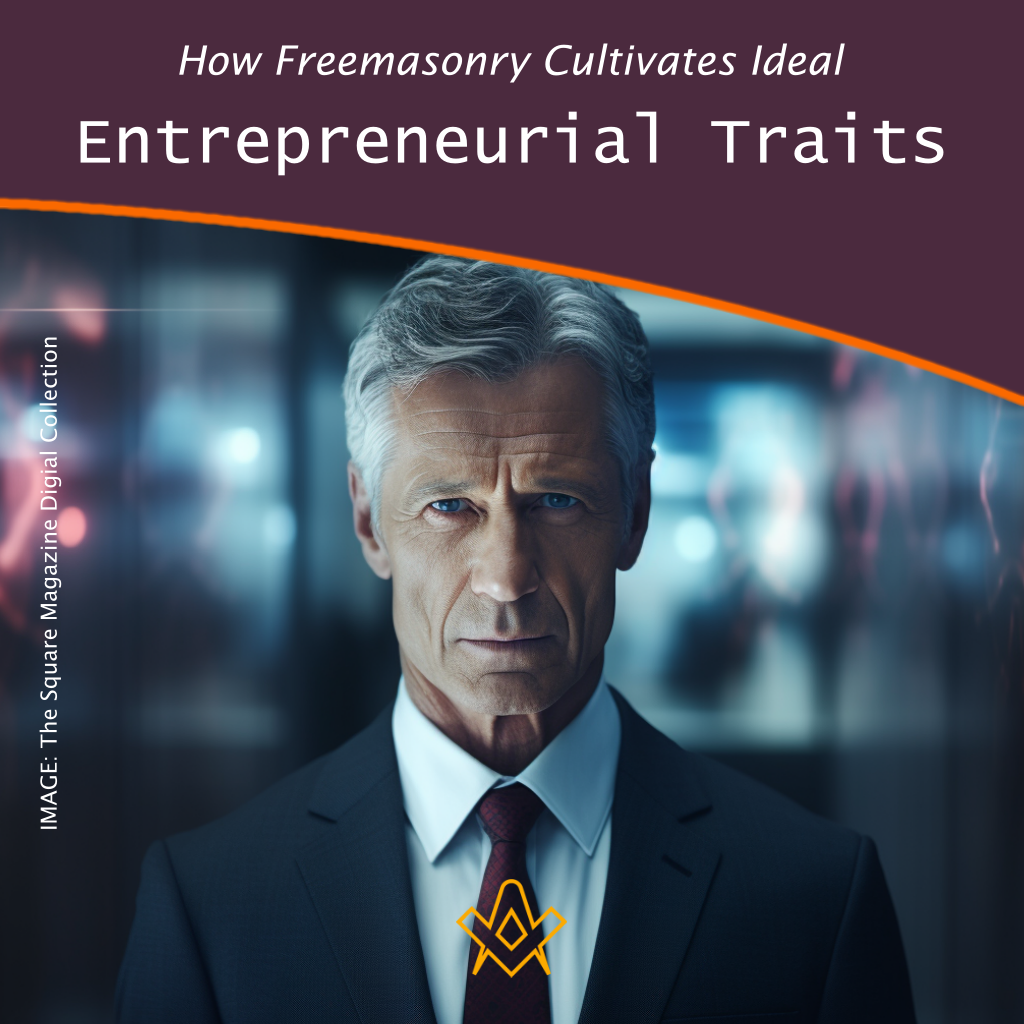How Freemasonry Cultivates Ideal Entrepreneurial Traits.
But behind closed lodge doors, its cryptic rituals and rich symbolism work to impart members with profound life lessons and skills for success.
As it turns out, many of the core teachings of Freemasonry align with ideal traits needed for entrepreneurship.
From cultivating boldness of vision to forging resilience through trials, Masonic rituals serve as masterclasses in the attributes required of business founders and leaders. By taking to heart the Order’s philosophies, members develop critical skills that unlock passion, creativity and achievement in their vocations.
In an entrepreneurial context, the most vital traits include zeal, grit, perceptiveness, imagination, prudence, ingenuity, foresight, alliance-building and persuasiveness. Freemasonry works on each of these capabilities through layered journeys of self-discovery and actualisation.
Passion
At its heart, Freemasonry is a passionate quest for truth, knowledge and meaning. Initiations into the Craft require deep commitment to personal improvement through exploration of moral symbols and life’s abiding mysteries. This passion serves as a cornerstone from which zeal and dedication carry into professional realms.
By taking solemn oaths to uphold high ideals, Masons foster an internal drive to strive for excellence.
Their fervour to better themselves extends into tireless ambition to advance worthy causes. This enthusiasm is the engine that powers perseverance through challenges.
Just as Masonic zeal underpins progress through degrees, it enables the grit needed to shepherd entrepreneurial projects from inspiration to reality.
Resilience
The road of Freemasonry is not an easy one. Advancing through its stages requires resilience to withstand tests of fortitude, integrity and discretion. Upon first entering a Lodge, candidates endure trials meant to push mental and emotional limits.
Through passing these crucibles, members build tenacity to weather difficult journeys ahead.
Much as Masonic trials strengthen resolve to complete initiation rites, so too do they impart grit to see personal visions through.
Success in business, as in Masonry, rests on practicing self-control and persistence even when progress seems halted. By emerging from tests of patience and courage, Freemasons condition the resilience muscle so critical for entrepreneurs.
Opportunity Recognition
A driving purpose of Freemasonry is the ceaseless search for Light – a metaphor for higher wisdom. This endless quest to pierce through superficial appearances trains pattern recognition and keen powers of observation.
It hones the ability to identify obscured defects and openings for improvement, much like an entrepreneur spots unmet needs.
Through contemplation of symbols and philosophical texts, Masons continuously exercise their mental faculties. Evaluating allegories and parsing meanings develops aptitude for identifying obscured truths and possibilities.
Just as Masonic teachings reveal deeper realities, they help cultivate the perceptiveness to recognize ripe opportunities for innovation.
Vision
Seeing through surfaces to essence is central to Freemasonry’s use of multi-layered symbolism. Its archetypes impart vision to look beyond immediate constraints toward transcendent potentials. This capacity for profound understanding guides the setting of soaring ambitions.
By wrestling with profound questions of purpose, Masons kindle imagination to conceive ideal futures they work toward realizing. Their mystic symbols paint pictures of virtues and noble ends to orient vision and actions.
This foundation uplifts members’ aims from modest goals to grand designs. It provides the perspective to elevate business visions from incremental gains to disruptive innovations.
Calculated Risk-Taking
While change-making visions require boldness, reckless zeal can be dangerous. Thus, Freemasonry advocates courage tempered with careful circumspection. Its teachings praise willingness to take risks, but only after prudent reflection.
By emphasizing preparation, debate and choice, Masonry provides a framework for managing uncertainty.
Leaps of faith are sometimes necessary in business, but reckless abandon often leads to ruin. The Masonic approach develops measured boldness – daring balanced with appropriate caution.
This weighs opportunity costs and mitigates hazards while still allowing forward movement. Mastering such moderation empowers entrepreneurs to take informed risks, securing gains while avoiding disastrous pitfalls.
Creativity
The initiations and ceremonies of Freemason lodges fuel creativity and ingenuity. As cryptic dramas conveying moral lessons, their potency lies in inventive presentations using symbolic set pieces. The ability to decipher their meanings also builds cognitive agility.
Generating fresh rituals and interpreting enigmatic concepts unlocks flexible thinking. The use of allegory and metaphor in Masonic teachings strengthens aptitude for crafting new associations and perspectives.
Just as members reimagine traditional forms, they can reframe challenges and devise unconventional solutions. This openness sparks the originality for entrepreneurial breakthroughs.
Foresight
Mapping journeys through Masonry’s degrees involves strategic planning to progress through self-actualization. As visionaries, members are called to chart courses securing passage through trials to expanded wisdom. This demands anticipating potential barriers and outcomes from choices made today.
By honing foresight for their own advancement within Lodges, Masons develop better discernment for long-range decision-making. The further along the Masonic path they climb, the wider their vantage becomes for surveying future horizons.
This prescience translates into entrepreneurs better predicting trends, avoiding hazards and aligning execution with enterprise goals.
Partnerships
The bonds uniting Masons as brothers run life-long, driving commitment to mutual trust and support. The Lodge serves as an incubator for interpersonal skills and relationship-building. Members gain proficiency in mediation, reliability and discretion while collaborating in rituals.
Smoothly operating enterprises depend on cultivating business partnerships. Masonic brotherhood imprints the value of steadfast alliance on members’ principles.
This makes cooperation second-nature to them, enabling entrepreneurs to seamlessly unite teams, co-create with clients and coordinate across organizations.
Partnership is etched into Masonic DNA, conveying an instinctive grasp of its make-or-break importance.
Communication
Oral traditions are the conduit for passing Freemasonry’s wisdom through the ages. Its emblematic teachings are conferred through recitation, interrogation and demonstration.
This necessitates clarity of expression, precision of word choice and mastery of memorization. Articulating meanings behind symbols trains impactful communication.
Bringing innovations to life demands being able to connect authentically, explain intelligibly and compel audiences. Masonic rituals drill these abilities, forging confidence and skill in concise, moving communication.
Entrepreneurs who internalize these lessons gain a persuasive edge in conveying visions, winning trust and enrolling support. The capacity to voice concepts powerfully ripples through an organization’s culture.
Conclusion
The ancient rituals of Freemason lodges continue to instil code, character and fluencies essential for today’s innovators. By wholeheartedly embracing the Craft’s lessons in skilful self-actualization, entrepreneurs can unlock their fullest potentials.
The path is long, but wisdom is revealed step by step to those whose passion and resilience keep them searching for Light. Through commitment to this profound journey of transformation, Masons develop the vital traits needed to achieve entrepreneurial greatness.
Recent Articles: skill series
 Freemasonry and Reskilling in the age of AI The article explores the challenges and strategies organizations face in reskilling their workforce in the era of automation and artificial intelligence. It highlights the need for companies to view reskilling as a strategic imperative and involve leaders and managers in the process. The article also emphasizes the importance of change management, designing programs from the employee's perspective, and partnering with external entities. |
 Ten Central Commandments or Principles of Freemasonry Embrace the wisdom of Freemasonry's teachings in your personal journey towards self-improvement and stronger leadership. By upholding virtues of integrity, compassion, and respect, and uniting these with a commitment to continuous learning and social responsibility, inspire change. Transform yourself and the world around you, fostering a legacy of positivity and enlightenment. |
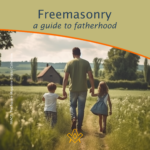 Freemasonry: A Guide to Fatherhood In the sacred halls of Freemasonry, fathers discover a hidden power to transform their parenting journey. With its timeless values, supportive community, and life-enriching teachings, Freemasonry empowers fathers to provide a moral compass, foster self-improvement, build stronger connections, and embrace the confidence and wisdom needed to navigate the complex realm of fatherhood. |
 Courage as a core value in Freemasonry Freemasonry, a revered fraternity, prioritizes virtues like honesty and charity. However, courage is foundational. From Plato to Maya Angelou, courage is vital for other virtues. Freemasonry's teachings, referencing events like Gettysburg, emphasize diverse courage forms. In today's divided world, Masons promote and exemplify courage, understanding its importance in facing challenges. |
 How Freemasonry Cultivates Ideal Entrepreneurial Traits Freemasonry's cryptic rituals hold timeless lessons for building entrepreneurial greatness. Through tests of passion, vision and skill, Masonic teachings forge ideal traits like grit, creativity and alliance-making needed to seize opportunity and elevate enterprises. The right commitment unlocks code for entrepreneurial success. |
 What you see praiseworthy in others "What you see praiseworthy in others, carefully imitate, and what in them may appear defective, you will in yourself amend". This passage of Masonic ritual (Taylors Working, Address to the w |
 How to Learn Ritual with a Learning Disorder So what do you do when faced with that little blue book? Most Masons when first looking at the ritual book can understandably be fazed – the tiny print, the missing words, the questions and answers! Learning ritual can be a challenging task for anyone, especially individuals with learning disorders, but it is not impossible. Here are some tips to help make the process easier. |
 A "mind palace", also known as a "memory palace", is a technique for memorizing and recalling information. How would your life change if you could remember anything and everything? Discover the 'Mind Palace' and all will be revealed. |
 What is leadership and who does freemasonry help develop those skills needed to be a better leader |
 A story of the 'Ruffians' – those individuals whose paths cross ours, who feel entitled to seize and consume the property of others that they have not earned. A lesson to build character to be a better citizen of the world. |
 Now we are back in the Lodge room once again, maybe it is time to review how we learn and deliver ritual and look at different ways of improving that process. |
 Making an advancement in Masonic Knowledge can become far easier when you 'learn how to learn'. |
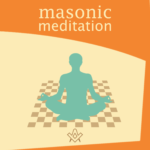 Learn how to practise Masonic meditation in a busy world with all its care and employments |
 Struggling to learn your ritual? Become a 5-Minute Ritualist with the aid of a book of the same name. |
 Day in the life of a Freemason As we start a new year, maybe start it with a new habit? |
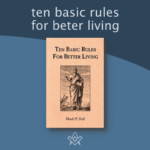 Ten Basic Rules For Better Living Ten Basic Rules For Better Living by Manly P Hall |
 How can we use masonic leadership skills to avoid confrontational situations? |
 How the Trivium is applied to Critical Thinking - {who, what, where, when} - {how} - {why} |
 The Seven Liberal Arts - why 'seven', why 'liberal', why 'arts'? |
 How to improve your public speaking skill with 6 techniques |
 Do you need to speak in public, or present Masonic ritual without notes ? |
 What are logical Fallacies and how to spot them |
 Share one easy tip to learn masonic ritual; Some good tips from Facebook followers |
 How can we use the 7 secrets of the greatest speakers in history |
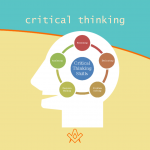 What is a critical thinker and what are their characteristics? |
 Share one personal skill Freemasonry helped you to improve? How can we make practical use of the lessons taught in Masonic writings? |
 An introduction to the art of public speaking - speak with confidence |
 Seven Liberal Arts and Sciences What do you know about Seven Liberal Arts and Sciences |
 Three Words That Will Change Your Life This article discuss a common situation found in many lodges - a difficulty in holding a conversation with a stranger. |
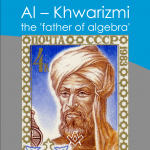 Al - Khwarizmi live c750 - c820 is credited as being the father of Algebra, being asked what is Man, give his answer in an algebraic expression |
masonic knowledge
to be a better citizen of the world
share the square with two brothers

click image to open email app on mobile device
